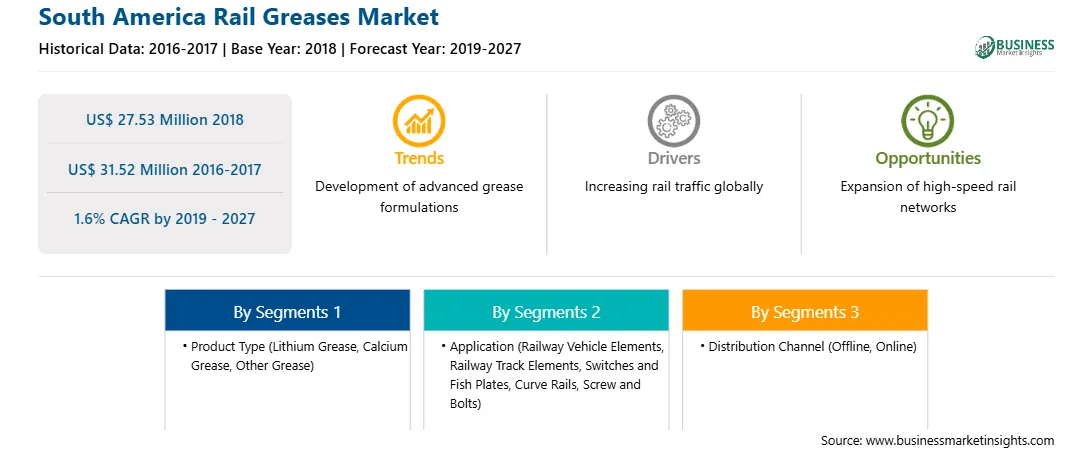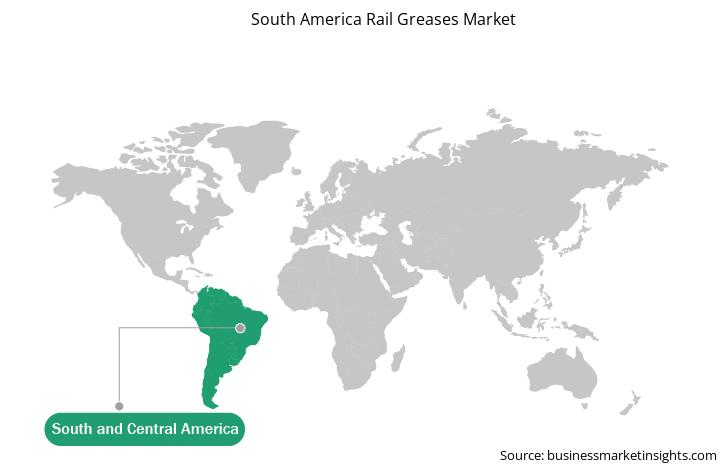Grease is a solid or semi-solid lubricating oil. It is usually comprised of mineral oil and thickeners such as calcium-based soap and lithium-based soaps. Greases may also contain additional lubricating particles, such as molybdenum disulfide, graphite, or polytetrafluoroethylene (PTFE). Different types of greases combine the lubricating properties of oils with added stickiness, which allows the lubricant to adhere to the surfaces better. Grease possesses characteristic features such as high initial viscosity, which make it frictional. It is popularly used across various industries such as automobile, railway, construction, pharmaceutical, food & beverage, mining, and numerous others. For rails, greases can be used in mechanisms where lubrication is frequently required, and lubricating oil does not stay for long. Grease acts as a sealant to avert ingress of water and incompressible materials. Soft grease is used in gearboxes, noise reduction, leakage resistance, and suspension of solid additives. Greased components consume a small amount of power and are an even less vulnerable impact to any wear tear damage. The demand of greases in the railway industry is growing due to the development of new railway infrastructure across significant countries such as Brazil, Argentina and Rest of SAM coupled with the maintenance activities of different parts used in railway transportation.
Strategic insights for the South America Rail Greases provides data-driven analysis of the industry landscape, including current trends, key players, and regional nuances. These insights offer actionable recommendations, enabling readers to differentiate themselves from competitors by identifying untapped segments or developing unique value propositions. Leveraging data analytics, these insights help industry players anticipate the market shifts, whether investors, manufacturers, or other stakeholders. A future-oriented perspective is essential, helping stakeholders anticipate market shifts and position themselves for long-term success in this dynamic region. Ultimately, effective strategic insights empower readers to make informed decisions that drive profitability and achieve their business objectives within the market.

| Report Attribute | Details |
|---|---|
| Market size in 2018 | US$ 27.53 Million |
| Market Size by 2027 | US$ 31.52 Million |
| Global CAGR (2019 - 2027) | 1.6% |
| Historical Data | 2016-2017 |
| Forecast period | 2019-2027 |
| Segments Covered |
By Product Type
|
| Regions and Countries Covered | South and Central America
|
| Market leaders and key company profiles |
The geographic scope of the South America Rail Greases refers to the specific areas in which a business operates and competes. Understanding local distinctions, such as diverse consumer preferences (e.g., demand for specific plug types or battery backup durations), varying economic conditions, and regulatory environments, is crucial for tailoring strategies to specific markets. Businesses can expand their reach by identifying underserved areas or adapting their offerings to meet local demands. A clear market focus allows for more effective resource allocation, targeted marketing campaigns, and better positioning against local competitors, ultimately driving growth in those targeted areas.

The rail greases market in SAM is expected to reach US$ 31.52 million by 2027
from
US$ 27.53 million in 2018 and is expected to grow at a CAGR of 1.6% from 2019 to 2027. The introduction of new technologies such as digitization in the conventional railway networks is the key factor driving the SAM rail greases market. Digitalization is changing the global economy at a growing rate and is transforming traditional setups and established processes to a profitable model on a long-term basis. The fourth industrial revolution and the intelligent networking of machines and factories in the Internet of Things will make the connection of software, mechanics, and electronics via the internet of a previously unfathomable complexity possible in the near future. These so-called cyber-physical systems will increase the net product across all sectors in the long term and give rise to a variety of new business models. For railways, the main impact of digitalization is on the model of operation. Technologies like artificial intelligence, big data and cloud computing, connectivity and autonomous driving will affect the industry. The rail industry use these technologies effectively to identify the maintenance activities, to monitor operation of each component in the rail network and preventive measures for particular mishap in terms of operation. Based on such results the rail industry can estimate the demand of lubricants and greases, replacement of components or maintenance of particular units in advance. This will help the rail industry to save cost and avoid disruptions in services. In addition, the adoption of new technologies will help in optimizing infrastructure and operating costs and increasing network capacity without building new infrastructure. Thus, digitization in the conventional railway networks supports the growth of rail greases and lubricants market indirectly.
Moreover,COVID-19 has affected economies and industries in various countries due to lockdowns, travel bans, and business shutdowns. The chemical and material industry are one of the major industries suffering serious disruptions such as supply chain breaks, disruptions in manufacturing due to lockdown and office shutdowns as a result of this outbreak. All these factors have greatly affected the rail grease market. Brazil has the highest number of COVID-19 cases, followed by Ecuador, Chile, Peru, and Argentina, among others. The government of SAM has taken an array of actions to protect their citizens and contain COVID-19’s spread. It is anticipated that SAM will face lower export revenues, both from the drop in commodity prices and reduction in export volumes, especially to China, Europe, and the United States, which are important trade partners. Containment measures in several countries of SAM will reduce economic activity in the manufacturing sectors for at least the next quarter, with a rebound once the epidemic is contained.
In terms of product type, the lithium grease segment accounted for the largest share of the SAM rail greases market in 2018. In terms of application, the railway vehicle elements segment held a larger market share of the rail greases market in 2018. Further, the offline segment held a larger share of the market based on distribution channel in 2018. The offline segment dominated the SAM Rail Greases market whereas the online and curve rails segment are expected to grow at fastest growth rate during the forecast period of 2019-2027.
A few major primary and secondary sources referred to for preparing this report on the rail greases market in SAM are company websites, annual reports, financial reports, national government documents, and statistical database, among others. Major companies listed in the report are Royal Dutch Shell Plc, Exxon Mobil Corporation,Total SA, Petroliam Nasional Berhad (Petronas), FUCHS, SKF Group, Chevron Corporation, Klüber Lubrication and Sinopec Corp. among others.
The List of Companies - SAM Rail Greases Market
The South America Rail Greases Market is valued at US$ 27.53 Million in 2018, it is projected to reach US$ 31.52 Million by 2027.
As per our report South America Rail Greases Market, the market size is valued at US$ 27.53 Million in 2018, projecting it to reach US$ 31.52 Million by 2027. This translates to a CAGR of approximately 1.6% during the forecast period.
The South America Rail Greases Market report typically cover these key segments-
The historic period, base year, and forecast period can vary slightly depending on the specific market research report. However, for the South America Rail Greases Market report:
The South America Rail Greases Market is populated by several key players, each contributing to its growth and innovation. Some of the major players include:
The South America Rail Greases Market report is valuable for diverse stakeholders, including:
Essentially, anyone involved in or considering involvement in the South America Rail Greases Market value chain can benefit from the information contained in a comprehensive market report.